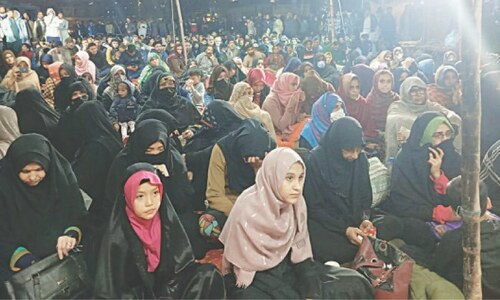KARACHI, Nov 22: Sindh will lose its freshwater natural assets within the next 15 to 20 years if no remedial measures are taken to improve the flow of water downstream Kotri Barrage. Loss of this natural wealth will result in an acute shortage of freshwater, manifold increase in cyclones and sea storms, large-scale displacement, drastic loss of cultivated land and fish population, while the shrimp industry will completely vanish with the shrinkage of mangrove forests.
Regional Director of the World Wide Fund for Nature (WWF) Karachi Dr Ghulam Akbar warned of this catastrophic scenario at a consultative workshop organised to revise the communication and awareness strategy of the Indus for All Programme (IAP). The event, organised by the WWF on Wednesday, was held at the Wetlands Centre, Sandspit.
Talking to Dawn, Dr Akbar said that the situation was already alarming with a loss of over 50 per cent of the mangrove area in Sindh and 30 to 40 per cent of cultivated land in Thatta and Badin over the past 20 years. If the status quo remained, there would be a drastic loss in the fish population and perhaps some fish species would completely be extinct, for instance Palla, which is already in the red zone and its catch had reduced from 75,000 metric tones to 5,000 MT in a decade.
“Sea intrusion would salinise water bodies triggering a freshwater shortage and erosion of the harbour. Destruction of mangroves means an end to the shrimp industry and manifold increase in cyclones and sea storms. The time has come that we understand that global climatic changes exist not in theory but are actually happening. Some examples are the recent cyclones in the world and the devastating floods in Balochistan and Sindh”, he said.
He expressed sorrow that a grave human issue that should have been dealt with on scientific lines had been politicised. An accord was reached in 1991 to increase the water flow from 5MAF to 10MAF downstream Kotri Barrage but it could never be implemented, he added.
“Indus basin management should be made a priority and judicious distribution of water should be ensured. Water shortage in irrigation can be met through adoption of latest technologies, for instance drip irrigation, and by growing crops that consume less water”, he said, while emphasising the need to grow indigenous plants as there were certain risks involved in growing exotic species.
“Two decades ago, Thatta and Badin used to have a good crop of red rice and banana. Today, due to increasing salinity, red rice is completely out while banana is under risk. People are growing betel leaf, an exotic plant, and spending a lot of money on fumigation as the plant is highly prone to pesticides”, he said.
Earlier, speakers at the workshop pointed out that powerful mafias involved in illegal activities in cahoots with government officials were the biggest threat to the environment. They said that the poor were wrongly targeted for habitat destruction and actually it was the men with vast resources that had inflicted more harm on Mother Nature. In that context, they gave examples of illegal hunting, logging as well as contamination of water bodies by landlords who were operating factories with complete disregard to the environment.
A challenge, Dr Akbar added, was also to make policy-makers environment-literate and disseminate such information among the masses, especially the youth and religious leaders, who had a big following in the rural areas.
“Effective communication is the key to achieve the goals of the IAP aimed to introduce community-based natural resource management and livelihoods”, he said, suggesting that some effective methods could be the formation of advocacy groups comprising members of civil society that could act as pressure groups, the launching of at least one local TV channel on the environment and the establishment of nature clubs in educational institutions.
The speakers included WWF regional manager environmental education Zafar Khan, programme coordinator Mustafa Talpur, NGO representatives and government officials from the Sindh Irrigation and Drainage Authority (Sida) and the Coastal Development Authority.















































Dear visitor, the comments section is undergoing an overhaul and will return soon.